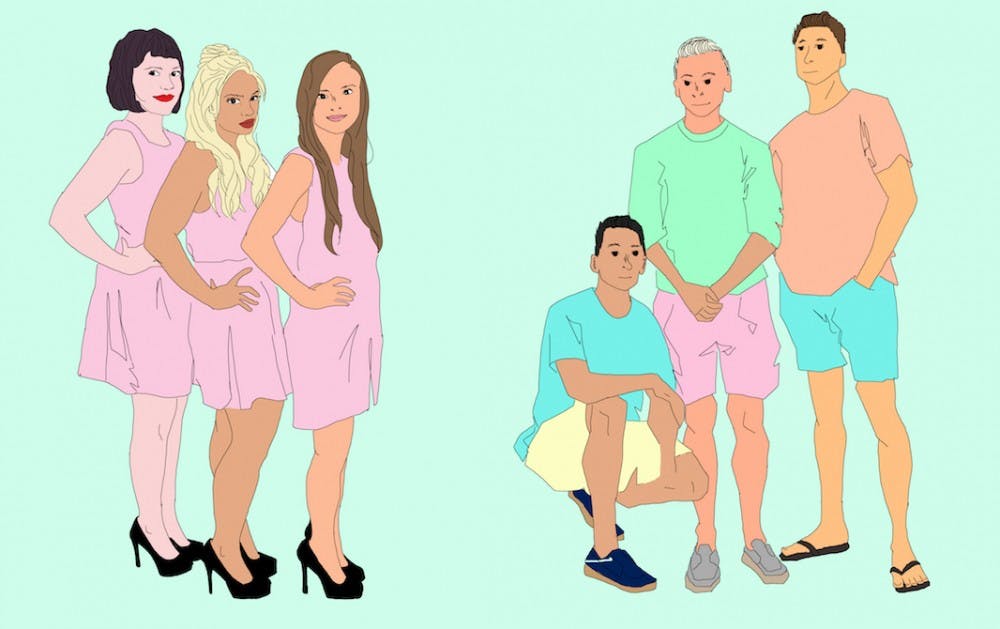When I went through formal recruitment in the fall 2017 semester, I never expected to hear so much negativity and disdain for sorority women from those around me.
Some of the comments I heard were the typical blanket statements on how sorority women weren't ambitious and joined these organizations for parties and boys.
Many of these stereotypes go beyond simply being harmful and actually reflect a larger issue of sexism in society in that they shame women for the decisions they make. While ASU Greek life is working to combat this, it is also the responsibility of the ASU community to avoid degrading a population of over 2,600 women.
Aryana Dahlgren, the director of Women’s Leadership in the Panhellenic Executive Council and a sophomore studying finance, said that people who are outside of Greek life often do not understand the reality of joining an organization.
“Going into Greek life, you see all the stereotypes on the movies of girls who are bimbos," Dahlgren said. "They’re blonde, they’re super skinny, they’re all white, they’re just in a sorority to have fun and party or they only care about boys. I went into it really blind, because I just wanted to disregard all the stereotypes that might not be true.”
These stereotypes, perpetuated by websites such as Greekrank, were used against me to no end while I was going through recruitment to the point where I was actually discouraged from pursuing Greek life by multiple people.
“It’s so sexist,” Dahlgren said. “You look at the fraternity men and nothing’s said about them about whatever major they have or them doing whatever they do. They don’t have a lot of rules that Panhellenic has, and there’s not a lot of criticism about them unless it’s something very big like sexual assault. But other than that, they don’t get criticized.”
Sorority women are often subject to judgement based on their major or what organization they are in, simply because they are women who choose to associate with other women.
The Panhellenic Association is working to combat these stereotypes for fall 2018 recruitment, which will be more values-based and less focused on appearances, according to Dahlgren.
Reducing the degradation of sorority women, however, is not just PHA’s battle, but rather the responsibility of every ASU student to be more cognizant of the stereotypes they see and how they are challenged by the reality of Greek life at the University.
But these stereotypes don’t just affect sorority women. Fraternities also have their own slew of stereotypes which some organizations are working to combat.
Brian Peck, one of the founding members of ASU's Theta Xi chapter and sophomore studying urban planning, said that his organization works to combat hazing culture and sexual violence in the Greek community.
“We’re only a couple of years old, and I was a part of the founding class, so we all kind of took a stance of trying to be a professional and social fraternity and trying to be something a little bit different,” Peck said. “We’ve taken a very big stance on branding ourselves as a no-hazing, respectful organization, whether it be towards potential new members, ourselves, sorority women or women in general, and I think that branding has really solidified our stance with those issues.”
Fraternity stereotypes often revolve around hazing or sexual violence. However, many organizations at ASU are working to reduce this impression. While the stereotypes vary by gender, they still degrade both groups.
“Some of it can be warranted,” Peck said. “I think that’s sort of a freshman thing coming in, trying to fit that stereotype and trying to make friends you portray yourself a certain way, but once you get into an organization, at least in our organization, it’s been the case where you can be who you want to be. I personally am under the impression that a fraternity should enhance your life, not really be your life.”
It is nearly impossible to separate gender from Greek life stereotypes, as organizations are often gender-exclusive. Furthermore, tearing down women who join sororities and viewing them as less ambitious or capable than those who don’t partake in Greek life is harmful to the one in ten ASU undergraduate women who choose to do so.
Contrary to the way sorority life is represented on media, ASU’s Panhellenic Association is focused on empowering women and encouraging them towards leadership.
When looking at Greek life, it's important not to judge based off of preconceived notions and instead look for yourself. In the 2016-2017 academic year, ASU Greek organizations raised over $500,000 collectively for charitable organizations.
These organizations also provide outlets for leadership, and in a community of over 50,000 students just on the Tempe campus, Greek life gives students an easy opportunity to make friends and professional connections.
“We are women in this world, and we are rising and emerging leaders,” Dahlgren said. “We need to recognize and keep empowering other women on campus, and we need to break down these stereotypes. We are women, and we can do a lot more than people say that we can do.”
The ASU community needs to be able to separate the media representation of Greek life from their peers involved in fraternity and sorority life and avoid negatively characterizing an individual based solely on this choice.
Reach the columnist at kalbal@asu.edu or follow @KarishmaAlbal on Twitter.
Editor’s note: The opinions presented in this column are the author’s and do not imply any endorsement from The State Press or its editors.
Want to join the conversation? Send an email to opiniondesk.statepress@gmail.com. Keep letters under 500 words and be sure to include your university affiliation. Anonymity will not be granted.
Like The State Press on Facebook and follow @statepress on Twitter.




